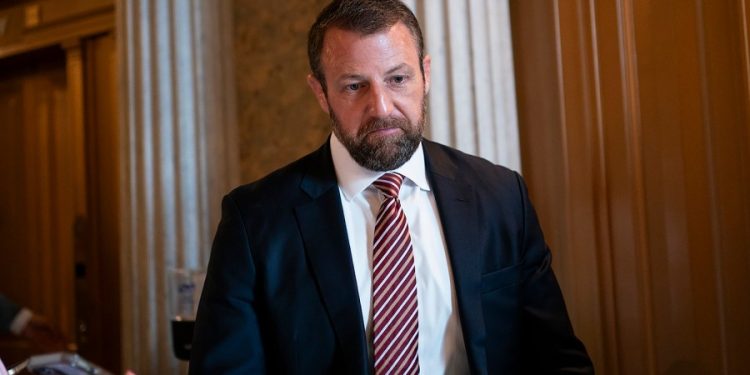Republicans are increasingly on the defensive over the party’s handling of Medicaid cuts in the party’s “big, beautiful bill,” underscoring how the issue has become an early flashpoint ahead of next year’s midterms.
A number of Republicans have been pressed about cuts to Medicaid in heated town halls and conferences, most recently Sen. Joni Ernst (R-Iowa), whose sarcastic response went viral and has been mocked among Democrats.
The moment underscored the challenge the party faces as it seeks to message on President Trump’s agenda while also responding to growing criticism from Democrats over changes to the health care program, which could lead to millions of people losing coverage.
“As Republicans are bringing this bill home, they’ve got to focus their message around that waste, fraud and abuse, and they need to make sure that the policy is focused around that waste, fraud and abuse as well,” said Brian Reisinger, a former Wisconsin Republican strategist and rural policy expert who’s authored “Land Rich, Cash Poor.”
House Republicans last month passed their sprawling package filled with several of Trump’s top priorities, including extending the 2017 tax cuts and an immigration crackdown — overcoming their first major hurdle as they look to clear a Fourth of July holiday deadline to pass the bill in the Senate and get it signed into law.
One of Democrats’ clearest criticisms over the bill is the impact Medicaid changes could have on Americans. Millions are estimated to be uninsured and vulnerable to losing Medicaid coverage under the bill, though it remains unclear exactly how many will be impacted.
Democrats and aligned groups like the Senate Democrats’ campaign arm and Protect Our Care have attacked Republicans in ads over the issue. And the issue has come up in some public events that Republicans have participated in, most recently Ernst’s town hall.
The Iowa Republican drew the ire of Democrats when she quipped that “we all are going to die” after an audience member shouted that people will die amid a discussion over the proposed Medicaid changes.
In that same town hall, Ernst noted that “Medicaid is extremely important here in the state of Iowa” and that “those that meet the eligibility requirements for Medicaid, we will protect.”
Speaking to reporters on Monday, Ernst defended her remarks, saying she was “very passionate” and that “you need to listen to the entire conversation.” But the fallout from the incident has been swift: a well-known Iowa Democrat, J.D. Scholten, jumped into the race following the controversy, and election handicapper Sabato’s Crystal Ball shifted the race slightly toward Democrats as a result.
Republicans have sought to counter the Democratic attacks, stressing the need for members of their party to frame the changes as part of an effort to make sure only those who really need Medicaid will have access to it.
“Narrative: Republicans are defending Medicaid for EVERY American who NEEDS and DESERVES it the most. That means seniors, low-income families, pregnant women, and disabled Americans, not fraudsters, able-bodied adults who refuse to work, or illegal immigrants,” reads messaging guidance from the House Republicans’ campaign arm. “FACT: Medicaid spending is going up year over year to support those in need.”
Most immigrants without legal status can’t qualify for Medicaid at the federal level, but some blue states have extended health care coverage to them. Republicans’ legislation would lower the federal matching rate for states that make health care coverage available to immigrants without legal status.
Other Republicans simply argue the party is tackling waste, fraud and abuse.
“The Democrats are just flat out lying about it. We’re not doing Medicaid reform,” Sen. Markwayne Mullin (R-Okla.), an ally of President Trump, told reporters on Monday. “We’re kicking off the waste and the fraud off of it, people that should never be on it.”
The Senate Republicans’ campaign arm has also played up other aspects of the bill — such as tax cuts and border security — suggesting Democrats running for Senate who voted against it are also voting against the interests of their constituents.
One Republican operative who requested anonymity to speak candidly acknowledged while the GOP was not “entirely on offense on the Medicaid issue,” they noted that the party was at least “muddying the waters and neutralizing it” by leaning into work requirements and illegal immigration.
Yet not all Republicans are on the same page. Sen. Josh Hawley (R-Mo.) has opposed some of the Medicaid changes included in the bill, expressing concern over how parts of the legislation could impact rural hospitals.
“I’m concerned about the provider [tax]. I mean, that’s not a direct benefit cut, but if it closes rural hospitals, I mean that’s … people can’t get coverage,” Hawley told reporters, referring to a provision of the bill that would help states fund Medicaid.
Sen. Susan Collins (R-Maine), who’s up for reelection next year, also said last month she was not going to support the bill “if there are deep cuts in Medicaid that would endanger health care for low-income families, for disabled children, for other vulnerable populations, and for our rural hospitals,” according to Maine Public.
Reisinger, the former Wisconsin Republican strategist, said the GOP’s messaging needs to focus on the waste, fraud and abuse that resonates with rural communities.
“Right now, voters are hearing … deeply conflicting information from Republicans [and] Democrats, and here’s the thing: Republicans need to remember that in rural areas, there are a lot of their voters who at one time voted for a blue-collar Democrat and could do so again,” he said.
“We don’t know if that’ll be in the near term, in the midterms,” he added. “We don’t know if that’ll be long term, but if they’re passing legislation that is not living up to the declarations around waste, fraud and abuse, and they’re actually passing legislation that has a deeply negative economic impact on rural America, that’s going to have an impact.”















